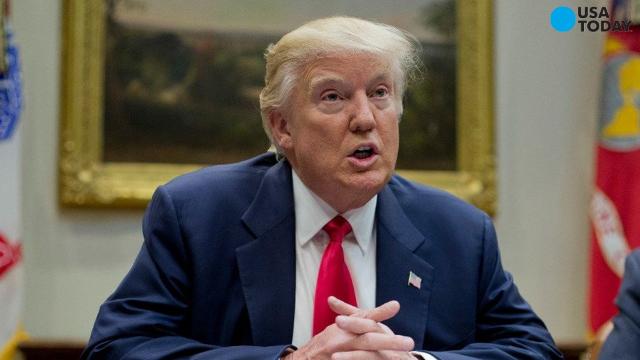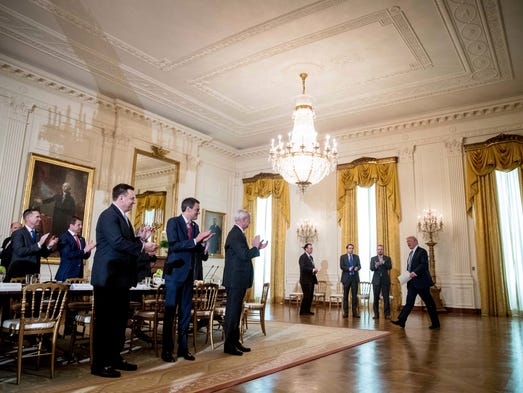
Hawaii has become the first state to file a lawsuit against President Donald Trump’s revised travel ban, saying the order will harm its Muslim population, tourism and foreign students. (March 9)
AP
Hawaii became the first state to sue over President Trump’s revised travel ban, saying in a lawsuit that it will disrupt families, harm Hawaii’s Muslim population, tourism and foreign students and is “antithetical to Hawaii’s state identity and spirit.”
“For many in Hawaii, including state officials, the executive order conjures up the memory of the Chinese Exclusion Acts and the imposition of martial law and Japanese internment after the bombing of Pearl Harbor,” the suit, filed by Attorney General Douglas Chin, asserts.
“Hawaii is special in that it has always been non-discriminatory in both its history and constitution,” Chin said. “Twenty percent of the people are foreign-born, 100,000 are non-citizens and 20% of the labor force is foreign-born.”
Attorneys for the state filed the lawsuit Wednesday in federal court in Honolulu. The state previously sued over Trump’s initial travel ban, but that lawsuit was put on hold while other cases played out across the country. Hawaii told the court it intended to file an amended lawsuit to cover the new ban, which is set to go into effect March 16.
The revised executive order bars new visas for people from six predominantly Muslim countries — Iran, Syria, Somalia, Sudan, Yemen and Libya — and temporarily halts the U.S. refugee program. The ban does not apply to persons with green cards or travelers who already have visas.
In its complaint, Hawaii says it is suing to protect its residents, businesses and schools, as well as its “sovereignty against illegal actions of President Donald J. Trump and the federal government.”
A plaintiff in the case is Imam Ismail Elshikh of the Muslim Association of Hawaii, who says the ban will keep his Syrian mother-in-law from visiting. The complaint, clearly aimed at establishing legal standing for bringing the suit, says Trump’s “executive order inflicts a grave injury on Muslims in Hawaii, including Dr. Elshikh, his family, and members of his mosque.”

Here’s what you should know about President Trump’s revised travel ban.
USA TODAY NETWORK
The complaint, in emphasizing what it asserts is the intent of the executive order, notes comments made by Trump during the presidential campaign regarding his intention to implement a Muslim ban, even though he later softened those remarks. It also notes Stephen Miller, a senior advisor to the president, told Fox News in February that the new travel ban would have the same effect as the old one.
The move came after a federal judge in Honolulu said earlier Wednesday that Hawaii can move forward with the lawsuit.
U.S. District Judge Derrick Watson granted the state’s request to continue with the case and set a hearing for March 15 — the day before Trump’s order is set to go into effect.
READ MORE:
The state will argue that the judge should impose a temporary restraining order preventing the ban from taking effect until the lawsuit has been resolved.
A federal judge in Seattle issued a temporary restraining order halting the initial ban after Washington state and Minnesota sued. The 9th U.S. Circuit Court of Appeals refused to reinstate the order.
While Hawaii is the first to sue to stop the revised ban, the restraining order is still in place and could apply to the new one, too, said Peter Lavalee, a spokesman for the Washington attorney general’s office, the Associated Press reports.
University of Richmond Law School professor Carl Tobias said Hawaii’s complaint seemed in many ways similar to Washington’s successful lawsuit, but whether it would prompt a similar result was tough to say.
He said he expects the judge, an appointee of President Obama who was a longtime prosecutor, to be receptive to “at least some of it.”
Given that the new executive order spells out more of a national security rationale than the old one and allows for some travelers from the six nations to be admitted on a case-by-case basis, it will be harder to show that the new order is intended to discriminate against Muslims, Tobias said.
“The administration’s cleaned it up, but whether they have cleaned it up enough I don’t know,” he said. “It may be harder to convince a judge there’s religious animus here.”
Tobias also said it is good that Hawaii’s lawsuit includes an individual plaintiff, considering that some legal scholars have questioned whether the states themselves have standing to challenge the ban.
Contributing: The Associated Press
Hawaii becomes 1st state to sue President Trump over new travel ban – USA TODAY








































































